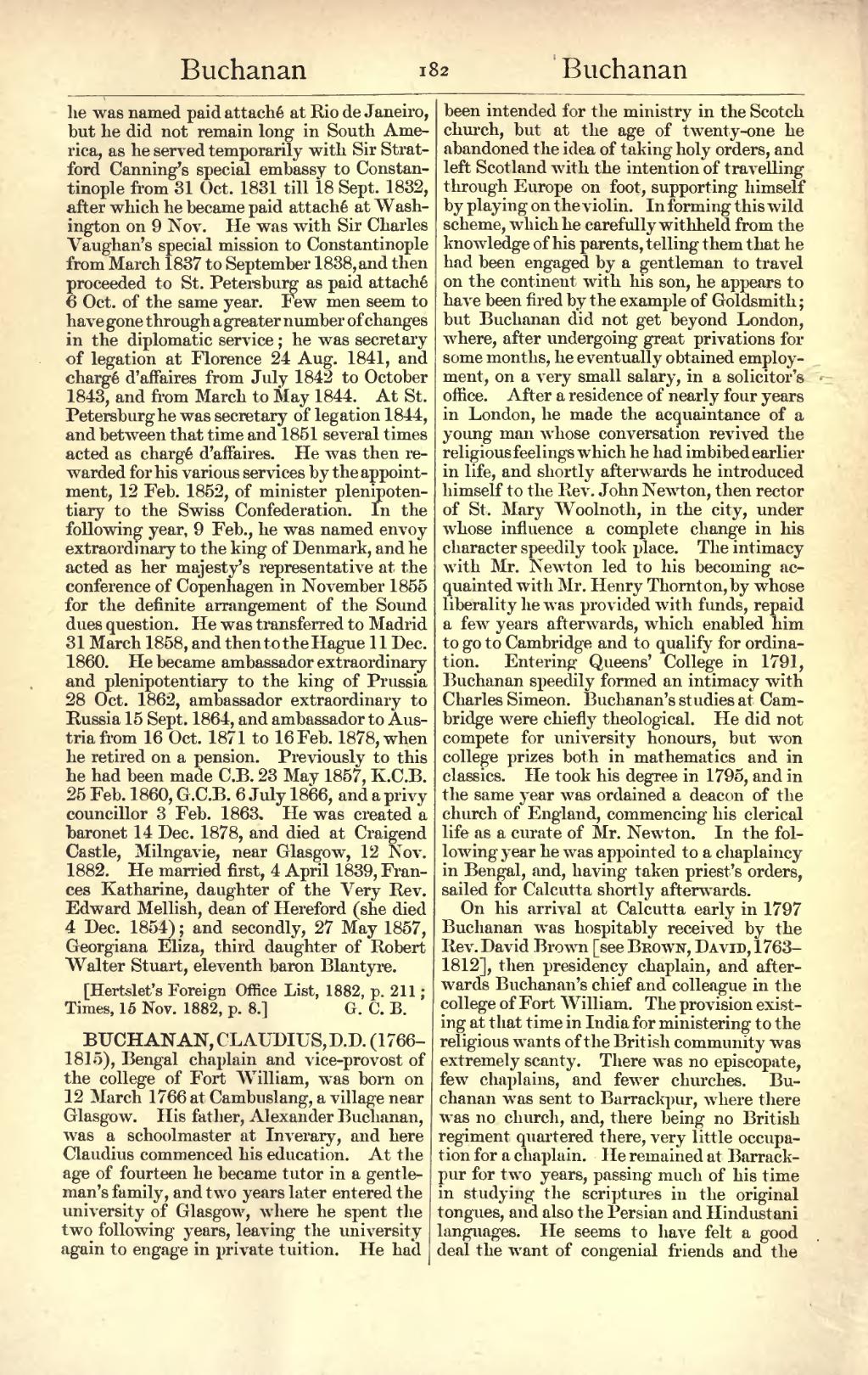he was named paid attaché at Rio de Janeiro, but he did not remain long in South America, as he served temporarily with Sir Stratford Canning's special embassy to Constantinople from 31 Oct. 1831 till 18 Sept. 1832, after which he became paid attaché at Washington on 9 Nov. He was with Sir Charles Vaughan's special mission to Constantinople from March 1837 to September 1838, and then proceeded to St. Petersburg as paid attaché 6 Oct. of the same year. Few men seem to have gone through a greater number of changes in the diplomatic service; he was secretary of legation at Florence 24 Aug. 1841, and chargé d'affaires from July 1842 to October 1843, and from March to May 1844. At St. Petersburg he was secretary of legation 1844, and between that time and 1851 several times acted as chargé d'affaires. He was then rewarded for his various services by the appointment, 12 Feb. 1852, of minister plenipotentiary to the Swiss Confederation. In the following year, 9 Feb., he was named envoy extraordinary to the king of Denmark, and he acted as her majesty's representative at the conference of Copenhagen in November 1855 for the definite arrangement of the Sound dues question. He was transferred to Madrid 31 March 1858, and then to the Hague 11 Dec. 1860. He became ambassador extraordinary and plenipotentiary to the king of Prussia 28 Oct. 1862, ambassador extraordinary to Russia 15 Sept. 1864, and ambassador to Austria from 16 Oct. 1871 to 16 Feb. 1878, when he retired on a pension. Previously to this he had been made C.B. 23 May 1857, K.C.B. 25 Feb. 1860, G.C.B. 6 July 1866, and a privy councillor 3 Feb. 1863. He was created a baronet 14 Dec. 1878, and died at Craigend Castle, Milngavie, near Glasgow, 12 Nov. 1882. He married first, 4 April 1839, Frances Katharine, daughter of the Very Rev. Edward Mellish, dean of Hereford (she died 4 Dec. 1854); and secondly, 27 May 1857, Georgiana Eliza, third daughter of Robert Walter Stuart, eleventh baron Blantyre.
[Hertslet's Foreign Office List, 1882, p. 211; Times, 15 Nov. 1882, p. 8.]
BUCHANAN, CLAUDIUS D.D. (1766–1815), Bengal chaplain and vice-provost of the college of Fort William, was born on 12 March 1766 at Cambuslang, a village near Glasgow. His father, Alexander Buchanan, was a schoolmaster at Inverary, and here Claudius commenced his education. At the age of fourteen he became tutor in a gentleman’s family, and two years later entered the university of Glasgow, where he spent the two following years, leaving the university again to engage in private tuition. He had been intended for the ministry in the Scotch church, but at the age of twenty-one he abandoned the idea of taking holy orders, and left Scotland with the intention of travelling through Europe on foot, supporting himself by playing on the violin. Informing this wild scheme, which he carefully withheld from the knowledge of his parents, telling them that he had been engaged by a gentleman to travel on the continent with his son, he appears to have been fired by the example of Goldsmith; but Buchanan did not get beyond London, where, after undergoing great privations for some months, he eventually obtained employment, on a very small salary, in a solicitor's office. After a residence of nearly four years in London, he made the acquaintance of a young man whose conversation revived the religious feelings which he had imbibed earlier in life, and shortly afterwards he introduced himself to the Rev. John Newton, then rector of St. Mary Woolnoth, in the city, under whose influence a complete change in his character speedily took place. The intimacy with Mr. Neelon led to his becoming acquainted with Mr. Henry Thornton, by whose liberality he was provided with funds, repaid a few years afterwards, which enabled him to go to Cambridge and to qualify for ordination. Entering Queens' College in 1791, Buchanan speedily formed an intimacy with Charles Simeon. Buchanan’s studies at Cambridge were chiefly theological. He did not compete for university honours, but won college prizes both in mathematics and in classics. He took his degree in 1795, and in the same your was ordained a deacon of the church of England, commencing his clerical life as a curate of Mr. Newton. In the following year he was appointed to a chaplaincy in Bengal, and, having taken priest’s orders, sailed for Calcutta shortly afterwards.
On his arrival at Calcutta early in 1797 Buchanan was hospitably received by the Rev. David Brown [see Brown, David, 1763-1812] then presidency chaplain, and afterwards Buchanan’s chief and colleague in the college of Fort William. The provision existing at that time in India for ministering to the religious wants of the British community was extremely scanty. There was no episcopate, few chaplains, and fewer churches. Buchanan was sent to Barrackpur, where there was no church, and, there being no British regiment quartered there, very little occupation for a chaplain. He remained at Barrackpur for two years, passing much of his time in studying the scriptures in the original tongues, and also the Persian and Hindustani languages. He seems to have felt a good deal the want of congenial friends and the
